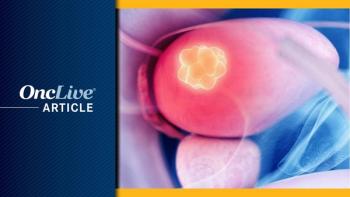
Dr Siefker-Radtke on the Efficacy of Erdafitinib vs Pembrolizumab in FGFR-Altered mUC

Arlene O. Siefker-Radtke, MD, discusses the efficacy of erdafitinib in patients with metastatic urothelial cancer with select FGFR alterations in the phase 3 THOR study.
Arlene O. Siefker-Radtke, MD, professor, Department of Genitourinary Medical Oncology, Division of Cancer Medicine, The University of Texas MD Anderson Cancer Center, discusses the efficacy of erdafitinib (Balversa) in patients with metastatic urothelial cancer (mUC) with select FGFR alterations in the phase 3 THOR study (NCT03390504).
The oral, pan-FGFR tyrosine kinase inhibitor e
The randomized, open-label THOR study assessed the efficacy of erdaftinib in 2 independent cohorts. In cohort 1, patients with FGFR-altered mUC who progressed on or after at least 1 prior line of therapy, including an anti–PD-L1 inhibitor, were randomly assigned to receive erdafitinib or chemotherapy. Previously reported data from this cohort showed that the agent extended overall survival (OS) vs chemotherapy. Cohort 2 randomly assigned patients with mUC who progressed on 1 prior treatment and were naïve to anti– PD-L1 inhibitors to receive erdafitinib or pembrolizumab (Keytruda).
Results from cohort 2 were presented at the
These results suggest that the sequencing of erdafitinib is important for patients with FGFR alterations in the second-line, Siefker-Radtke says. Accordingly, treatment with an immune checkpoint inhibitor prior to erdafitinib is recommended for patients who were previously exposed to chemotherapy, Siefker-Radtke advises. However, treatment decision-making should take individual patient characteristics into account, as select populations may benefit from further cytoreduction prior to treatment with immunotherapy, she concludes.



































